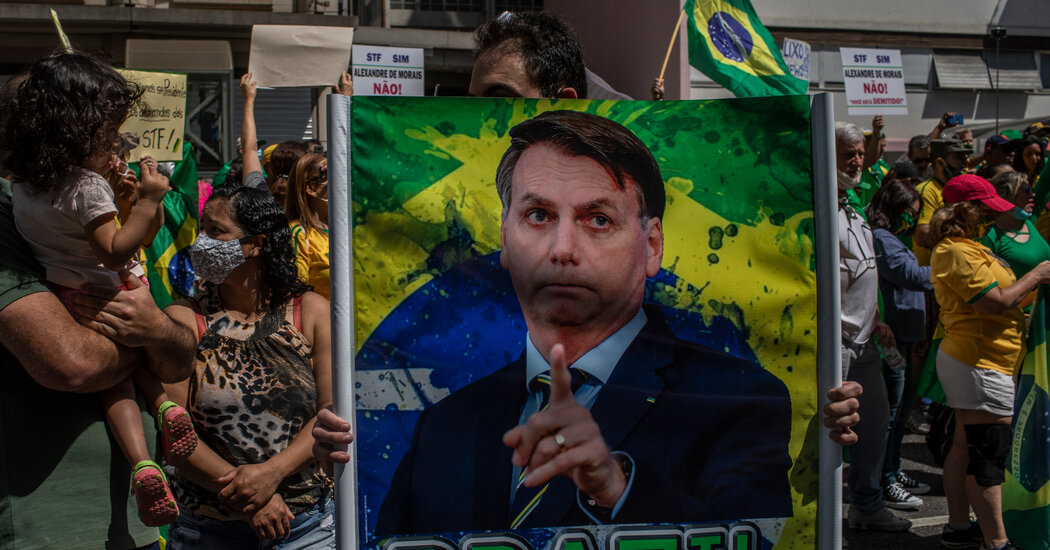
President Jair Bolsonaro of Brazil is temporarily banning social media companies from removing certain content, including his claims that the only way he’ll lose next year’s elections is if the vote is rigged — one of the most significant steps by a democratically elected leader to control what can be said on the internet.
The new social media rules, issued this week and effective immediately, appear to be the first time a national government has stopped internet companies from taking down content that violates their rules, according to internet law experts and officials at tech companies. And they come at a precarious moment for Brazil.
Mr. Bolsonaro has used social media as a megaphone to build his political movement and make it to the president’s office. Now, with polls showing he would lose the presidential elections if they were held today, he is using sites like Facebook, Twitter and YouTube to try to undermine the legitimacy of the vote, following the playbook of his close ally, former President Donald J. Trump. On Tuesday, Mr. Bolsonaro repeated his claims about the election to thousands of supporters in two cities as part of nationwide demonstrations on Brazil’s Independence Day.
Under the new policy, tech companies can remove posts only if they involve certain topics outlined in the measure, such as nudity, drugs and violence, or if they encourage crime or violate copyrights; to take down others, they must get a court order. That suggests that, in Brazil, tech companies could easily remove a nude photo, but not lies about the coronavirus. The pandemic has been a major topic of disinformation under Mr. Bolsonaro, with Facebook, Twitter and YouTube all having removed videos from him that pushed unproven drugs as coronavirus cures.
“You can only imagine how hard it would be for a big platform to get a judicial order for every single piece of disinformation they find,” said Carlos Affonso Souza, a law professor at Rio de Janeiro State University.
Mr. Affonso Souza said companies had 30 days to update their policies before facing penalties.
Social media giants denounced the new rules, saying they would allow harmful information to spread. Facebook and YouTube said they hadn’t yet changed how they handle content in Brazil. Twitter declined to say.
Brazil’s new internet rules are the latest effort in a larger fight that conservatives are waging against Silicon Valley. Politicians and pundits on the right have argued that tech companies are censoring conservative voices, and increasingly they have pushed laws making it harder for social networks to remove posts or accounts from their sites.
Florida passed a law in May that would fine internet companies that bar any political candidate from their sites, though a federal judge blocked it a month later. The governor of Texas is expected to soon sign a similar bill into law. Other countries have proposed similar legislation, but Brazil’s new policy appeared to be the most significant measure to be enacted on a national level.
In a Twitter post, Mr. Bolsonaro’s government said the policy “forbids the removal of content that may result in any kind of ‘censorship of political, ideological, scientific, artistic or religious order.’”
In addition to limiting what sorts of posts companies can take down, the rules can also require tech companies to justify removal of any post or any account, even those involving the protected exceptions. The government can then force the companies to restore the post or account if it decides the removal was unwarranted.
Facebook said that the “measure significantly hinders our ability to limit abuse on our platforms” and that the company agrees “with legal experts and specialists who view the measure as a violation of constitutional rights.”
Twitter said the policy transforms existing internet law in Brazil, “as well as undermines the values and consensus it was built upon.”
YouTube said it was still analyzing the law before making any changes. “We’ll continue to make clear the importance of our policies, and the risks for our users and creators if we can’t enforce them,” the company said.
It was unclear how the measure would affect content outside of Brazil.
Far-reaching though they are, the new rules probably won’t last, according to political and legal analysts who track Brazil. Mr. Bolsonaro issued them as a so-called provisional measure, a type of emergency order intended to address urgent situations. Such measures expire in 120 days if Brazil’s Congress does not make them permanent. Some members of Congress have already publicly opposed the measure, and five political parties and a Brazilian senator have filed lawsuits with the nation’s Supreme Court seeking to block it.
But Mr. Bolsonaro told supporters at a rally on Tuesday that he would ignore rulings from one Supreme Court justice who has helped lead investigations into Mr. Bolsonaro’s administration, alarming observers around the world that the president is threatening Brazil’s democracy.
Mr. Affonso Souza, the law professor, said that the country’s Supreme Court could strike down the measure before internet companies had to comply, but argued that it had set a dangerous precedent.
The president, he said, had created a way to ensure that disinformation “stays up on the internet and makes it easier for it to spread.”
Mr. Bolsonaro has taken other steps to make online disinformation harder to fight. This month, for instance, he vetoed part of a national-security law that would have set criminal penalties for people found guilty of orchestrating mass disinformation campaigns.
Matthew Taylor, director of the Brazil Research Initiative at American University, said that Mr. Bolsonaro was using the internet policy to rally his supporters and distract from scandals around his handling of the pandemic and his clashes with the courts. Mr. Bolsonaro has portrayed this moment as crucial to the fate of his political movement.
“The timing was no mistake,” Mr. Taylor said of the policy, which was enacted on the eve of protests that Mr. Bolsonaro had hoped would stir up support for his embattled presidency. “This is playing to Bolsonaro’s domestic audience.”
The Brazilian government said in its post on Twitter that it was “taking the global lead in defending free speech on social networks and protecting the right of citizens to freedom of thought and expression.” The government did not respond to requests for further comment.
Mr. Bolsonaro has alarmed many sectors of Brazil in recent months with his increasingly authoritarian responses to a series of political crises, including a spiraling pandemic, economic travails, judicial investigations into him and his family, and falling poll numbers. He has attacked Brazil’s electronic voting system as a reason to discount the coming election, and he has recently told supporters there are only three outcomes to his presidency: He gets re-elected, jailed or killed.
In July, YouTube removed 15 of Mr. Bolsonaro’s videos for spreading misinformation about the coronavirus. And late last month, YouTube said that, under orders from a Brazilian court, it had stopped payments to 14 pro-Bolsonaro channels that had spread false information about next year’s presidential elections.
Brazil’s Supreme Court has also been investigating disinformation operations in the country. Mr. Bolsonaro became a target of those investigations last month, and several of his allies have been questioned or detained.
This week, Jason Miller, a former adviser to Mr. Trump, was detained for three hours at an airport in Brasília, the nation’s capital, where he had traveled for a conservative political conference. In an interview, Mr. Miller said the authorities told him they were questioning him as part of a Supreme Court investigation. “It was ridiculous,” he said. “It really shows how much free speech is under assault in the country of Brazil.”
Mr. Bolsonaro, a right-wing populist who won the presidential election in 2018, has long been compared to Mr. Trump. His recent actions — including the claims of a rigged election, skepticism of the coronavirus and complaints about Big Tech censorship — have deepened the similarities.
Mr. Trump lost his loudspeaker this year when tech companies kicked him off their sites for comments he made related to the storming of the U.S. Capitol in January.
Lately, Mr. Bolsonaro has sought to reduce his dependence on the major tech companies. On Monday, he urged people on Twitter and Facebook to follow him on Telegram, a messaging service with a more hands-off approach to content.
Daphne Keller, who teaches internet law at Stanford University, said conservative politicians have proposed laws like the Brazilian measure in the United States, Poland and Mexico, but that none had passed.
“If platforms have to carry every single thing that’s legal, they’ll turn into horrible cesspools that no one wants to use,” Ms. Keller said. “It’s a mechanism for the government to put their thumb on the scales to say what gets seen on the internet.”
Lis Moriconi contributed reporting.




